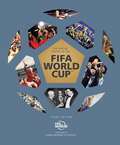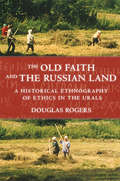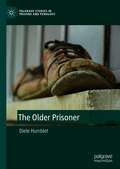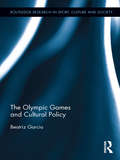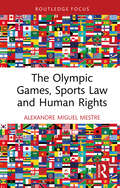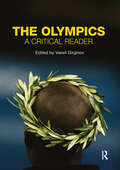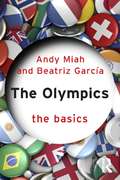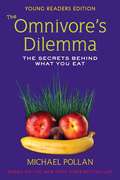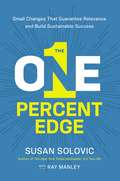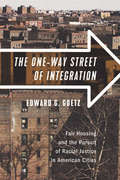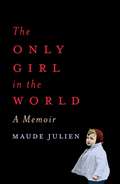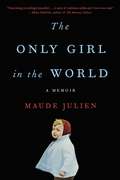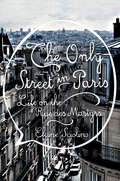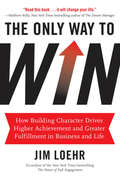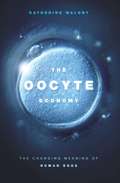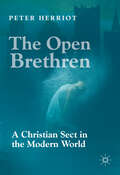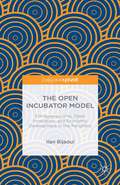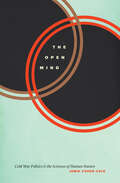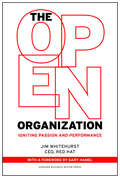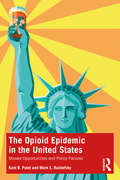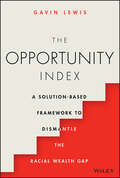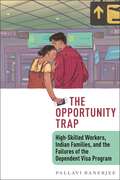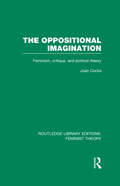- Table View
- List View
The Official History of the FIFA World Cup
by FIFA Museum FIFA MuseumFully updated - includes the full story of the 2022 FIFA World Cup Qatar.The Official History of the FIFA World Cup is the definitive inside story of the 22 FIFA World Cups to have taken place since the inaugural tournament in 1930. Packed with stunning photography, unique official documents and in-depth statistics, it is a must-read for any football fan around the world.No other event in the sporting world can rival the glamour, impact, fervent following and universal appeal of the FIFA World Cup. This unique official book tells the stories behind the scenes, as well as analyzing the most famous incidents. It features the biggest stars and many previously unknown ones too, all with a unique worldwide point of view.
The Official History of the FIFA World Cup
by FIFA Museum FIFA MuseumFully updated - includes the full story of the 2022 FIFA World Cup Qatar.The Official History of the FIFA World Cup is the definitive inside story of the 22 FIFA World Cups to have taken place since the inaugural tournament in 1930. Packed with stunning photography, unique official documents and in-depth statistics, it is a must-read for any football fan around the world.No other event in the sporting world can rival the glamour, impact, fervent following and universal appeal of the FIFA World Cup. This unique official book tells the stories behind the scenes, as well as analyzing the most famous incidents. It features the biggest stars and many previously unknown ones too, all with a unique worldwide point of view.
The Old Faith and the Russian Land: A Historical Ethnography of Ethics in the Urals (Culture and Society after Socialism)
by Douglas RogersThe Old Faith and the Russian Land is a historical ethnography that charts the ebbs and flows of ethical practice in a small Russian town over three centuries. The town of Sepych was settled in the late seventeenth century by religious dissenters who fled to the forests of the Urals to escape a world they believed to be in the clutches of the Antichrist. Factions of Old Believers, as these dissenters later came to be known, have maintained a presence in the town ever since. The townspeople of Sepych have also been serfs, free peasants, collective farmers, and, now, shareholders in a post-Soviet cooperative.Douglas Rogers traces connections between the town and some of the major transformations of Russian history, showing how townspeople have responded to a long series of attempts to change them and their communities: tsarist-era efforts to regulate family life and stamp out Old Belief on the Stroganov estates, Soviet collectivization drives and antireligious campaigns, and the marketization, religious revival, and ongoing political transformations of post-Soviet times. Drawing on long-term ethnographic fieldwork and extensive archival and manuscript sources, Rogers argues that religious, political, and economic practice are overlapping arenas in which the people of Sepych have striven to be ethical-in relation to labor and money, food and drink, prayers and rituals, religious books and manuscripts, and the surrounding material landscape.He tracks the ways in which ethical sensibilities-about work and prayer, hierarchy and inequality, gender and generation-have shifted and recombined over time. Rogers concludes that certain expectations about how to be an ethical person have continued to orient townspeople in Sepych over the course of nearly three centuries for specific, identifiable, and often unexpected reasons. Throughout, he demonstrates what a historical and ethnographic study of ethics might look like and uses this approach to ask new questions of Russian, Soviet, and post-Soviet history.
The Older Prisoner (Palgrave Studies in Prisons and Penology)
by Diete HumbletThis book critically explores the world of older prisoners to provide a more nuanced understanding of imprisonment at old age. Through an ethnographical study of male and female older prisoners in two Belgian prison settings, one in which older prisoners are integrated and one in which they are segregated, it informs debates and seeks to recognise ageist discourse, attitudes, practices in prison. The Older Prisoner seeks to situate the older prisoner from both a penological and gerontological perspective, organised around the following broad themes: the construction of the older prisoner, the physical prison world, the social prison world, surviving prison and giving meaning. The book allows readers to navigate between contrasting perspectives and voices rather than reinforcing traditional narratives and prevailing discourses on the older prisoner. In doing so, it hopes to open up a broader dialogue on ageing and punishment. It also offers insights into the concept of meaning in life as an analytical tool to study prisoners.
The Olympic Games and Cultural Policy (Routledge Research in Sport, Culture and Society)
by Beatriz GarciaThis book explores how cultural policies are reflected in the design, management and promotion of the Olympic Games. Garcia examines the concept and evolution of cultural policies throughout the recent history of the Olympic Games and then specifically evaluates the cultural program of the Sydney 2000 Olympic Games. She argues that the cultural relevance of a major event is highly dependent on the consistency of the policy choices informing its cultural dimensions, and demonstrates how such events frequently fail to leave long-term cultural legacies, and are often unable to provide an experience that fully engages and represents the host community, due to their over-emphasis on an economic rather than a social and cultural agenda.
The Olympic Games, Sports Law and Human Rights (Routledge Focus on Sport, Culture and Society)
by Alexandre Miguel MestreThis book explores the relationship between sports law, the Olympic Movement and human rights. Examining the historical legal roots of contemporary "Olympic law", including the ancient history of the Olympic Games and the legacy of Pierre de Coubertin, this book shines new light on one of the most important issues in world sport today.Written by a practising lawyer with expertise in sports law, this book explains the core concepts underpinning Olympic law and offers in-depth analysis of the Olympic Charter, arguing that the Charter is a key legal instrument in the context of which the interplay between ethics, rights and the Olympics must be understood. The book also examines key contemporary issues at the nexus of sports law and human rights, including religious freedom and protests by athletes.Offering a new interdisciplinary perspective on Olympic law, drawing on legal theory, history and contemporary social scientific studies in sport, this book is fascinating reading for any advanced student, researcher, policymaker or practitioner with an interest in sports law, the Olympic Games, mega-events or human rights.
The Olympics: A Critical Reader
by Vassil GirginovThe Olympics: A Critical Reader represents a unique, critical guide to the definitive sporting mega-event and the wider phenomenon it represents – Olympism. Combining classic texts and thoughtful editorial discussion with challenging new pieces, including previously unseen material, the book systematically addresses the key questions in modern Olympism, including:what does studying Olympism entail?how do historical accounts create and challenge Olympic myths?how do different theoretical perspectives inform our understanding of Olympism?which socio-political processes influence personal, collective and imagined Olympic identities?how do we experience and make sense of Olympism?who owns Olympism and why does it matter?how do cities compete for and celebrate the Olympics?How are the Olympic values promoted?why is it important to protect the ethical principles and properties of Olympism?what are the grounds for contesting Olympism?how can Olympism be taught?how can the principles and practices of Olympism be sustained in the future?Each thematic part has been designed to include a range of views, including background treatment of an issue as well as critical scholarship, to ensure that students develop a well-rounded understanding of the Olympic phenomenon. The Olympics: A Critical Reader is essential reading for students of the Olympics and Olympism, the sociology of sport, sport management and cultural studies.
The Olympics: The Basics (The Basics)
by Beatriz Garcia Andy MiahThe Olympics: The Basics is an accessible, contemporary introduction to the Olympic movement and Games. Chapters explain how the Olympics transcend sports, engaging us with a range of contemporary philosophical, social, cultural and political matters, including: peace development and diplomacy management and economics corruption, terror and activism the rise of human enhancement ethics and environmentalism. This book explores the controversy and the legacy of the Olympics, drawing attention to the deeper values of Olympism, as the Olympic movement’s most valuable intellectual property. This engaging, lively, and often challenging book, is essential reading for newcomers to Olympic studies and offers new insights for Olympic scholars.
The Omnivore's Dilemma: The Secrets Behind What You Eat (Young Readers Edition)
by Michael PollanThe New York Times bestseller that's changing America's diet is now perfect for younger readers. "What's for dinner?" seemed like a simple question--until journalist and supermarket detective Michael Pollan delved behind the scenes. From fast food and big organic to small farms and old-fashioned hunting and gathering, this young readers' adaptation of Pollan's famous food-chain exploration encourages kids to consider the personal and global health implications of their food choices. In a smart, compelling format with updated facts, plenty of photos, graphs, and visuals, as well as a new afterword and backmatter, The Omnivore's Dilemma serves up a bold message to the generation that needs it most: It's time to take charge of our national eating habits--and it starts with you.
The One-Percent Edge: Small Changes That Guarantee Relevance And Build Sustainable Success
by Susan Solovic Ray ManleyWant to stay competitive? Keep evolving.Solid profits, a strong brand, steady customers — all of these can vanish when market shifts disrupt business as usual. So how do you keep from losing ground? How do you stay a step ahead of competitors?The solution is surprisingly straightforward: innovate tweak by tweak. By making incremental adjustments to every aspect of the business — marketing, customer service, finances, products, people — then repeating the process, fixing weaknesses and spotting opportunities becomes a winning habit.Entrepreneur Susan Solovic, an expert in business survival tactics, explains how to continually grow, improve, and move the business forward. With hundreds of strategies, examples, and a six-step process, The One-Percent Edge explains how to:Put energy into profitable areas and trim dead weightRaise prices by selling value instead of thingsAccess new markets by adapting products or servicesHire the right team playersTurn customers into brand ambassadorsFind your own niche and avoid imitatingAnd moreWhen change happens swiftly and often, even successful brands are vulnerable. Businesses with the edge are constantly evolving . . . and pulling ahead of the pack.
The One-Way Street of Integration: Fair Housing and the Pursuit of Racial Justice in American Cities
by Edward G. GoetzThe One-Way Street of Integration examines two contrasting housing policy approaches to achieving racial justice. Integration initiatives and community development efforts have been for decades contrasting means of achieving racial equity through housing policy. Goetz traces the tensions involved in housing integration and policy to show why he doesn't see the solution to racial injustice as the government moving poor and nonwhite people out of their communities. The One-Way Street of Integration critiques fair housing integration policies for targeting settlement patterns while ignoring underlying racism and issues of economic and political power. Goetz challenges liberal orthodoxy, determining that the standard efforts toward integration are unlikely to lead to racial equity or racial justice in American cities. In fact, in this pursuit it is the community development movement rather that has the greatest potential for connecting to social change and social justice efforts.
The Only Girl in the World: A Memoir
by Maude JulienFor readers of Damaged and Running with Scissors, a chilling exploration of psychological control that ends with a glorious escape. Maude still remembers the sound of the gate being locked behind her. She was three years old when they moved into the secluded manor and in the coming years, she would only be allowed out a handful of times. Her parents belonged to a fanatical Masonic order. She followed a strict schedule of study, hard labour and endless drills designed to &‘eliminate weakness&’, such as holding an electric fence without flinching and sitting in a rat-infested cellar. But despite their chilling psychological control, her parents could not control her inner life. Befriending animals on the lonely estate and characters in the books she read, Maude nurtured in herself the compassion and love her parents forbade.
The Only Girl in the World: A Memoir
by Maude JulienAN AMAZON BEST BOOK OF THE MONTH. For readers of Room and The Glass Castle, an astonishing memoir of one woman rising above an unimaginable childhood. Maude Julien's parents were fanatics who believed it was their sacred duty to turn her into the ultimate survivor--raising her in isolation, tyrannizing her childhood and subjecting her to endless drills designed to "eliminate weakness." Maude learned to hold an electric fence for minutes without flinching, and to sit perfectly still in a rat-infested cellar all night long (her mother sewed bells onto her clothes that would give her away if she moved). She endured a life without heat, hot water, adequate food, friendship, or any kind of affectionate treatment.But Maude's parents could not rule her inner life. Befriending the animals on the lonely estate as well as the characters in the novels she read in secret, young Maude nurtured in herself the compassion and love that her parents forbid as weak. And when, after more than a decade, an outsider managed to penetrate her family's paranoid world, Maude seized her opportunity. By turns horrifying and magical, The Only Girl in the World is a story that will grip you from the first page and leave you spellbound, a chilling exploration of psychological control that ends with a glorious escape.
The Only Street in Paris: Life On The Rue Des Martyrs
by Elaine SciolinoA New York Times Bestseller: “Sciolino’s sharply observed account serves as a testament to . . . Paris— the city of light, of literature, of life itself.” —The New Yorker Elaine Sciolino, the former Paris Bureau Chief of the New York Times, invites us on a tour of her favorite Parisian street, offering an homage to street life and the pleasures of Parisian living. “I can never be sad on the rue des Martyrs,” Sciolino explains, as she celebrates the neighborhood’s rich history and vibrant lives. While many cities suffer from the leveling effects of globalization, the rue des Martyrs maintains its distinct allure. On this street, the patron saint of France was beheaded and the Jesuits took their first vows. It was here that Edgar Degas and Pierre-Auguste Renoir painted circus acrobats, Emile Zola situated a lesbian dinner club in his novel Nana, and François Truffaut filmed scenes from The 400 Blows. Sciolino reveals the charms and idiosyncrasies of this street and its longtime residents—the Tunisian greengrocer, the husband-and-wife cheesemongers, the showman who’s been running a transvestite cabaret for more than half a century, the owner of a 100-year-old bookstore, the woman who repairs eighteenth-century mercury barometers—bringing Paris alive in all of its unique majesty. The Only Street in Paris will make readers hungry for Paris, for cheese and wine, and for the kind of street life that is all too quickly disappearing.
The Only Way to Win: How Building Character Drives Higher Achievement and Greater Fulfillment in Business and Life
by Jim LoehrWhy Winning with Character Is the Only Way to WinThe conditioning begins early in our lives. Great achievements will bring lasting happiness and fulfillment; great achievements form the bedrock of stable self-esteem and strong character; great achievements will become the foundation for a successful life. If these well-intentioned promises are true, why does winning never seem to be enough? In The Only Way to Win, Jim Loehr draws upon two decades of work with Fortune 500 executives; world-class athletes such as Monica Seles, Dan Jansen, and Eric Lindros; and other high achievers at the Human Performance Institute (HPI) to reveal surprising insights about achievement motivation. Specifically, Loehr finds that the blind pursuit of external achievement often results in emptiness, addiction, and, ironically, poor performance. It's not really about what you achieve, he argues, it's about who you become as a consequence of the chase. As Loehr powerfully demonstrates, success at work and fulfillment in life require a complete re-purposing of achievement, one where value is derived from growth in areas such as integrity, honesty, gratefulness, humility, optimism, and compassion. To help readers start this process, he provides them with the tools they need to develop these character traits, as well as the plan they need to use them effectively.A compelling, practical, and hopeful read filled with relatable stories and useful exercises, The Only Way to Win will serve as a powerful wake-up call for business leaders, employees, teachers, and coaches. It will also provide inspiration for readers looking to perform better, achieve more, and change both their own lives and those of the people they influence. Jim Loehr is a world-renowned performance psychologist, co-founder of the Human Performance Institute, and author of fifteen books, including his most recent, The Power of Story. He also co-authored the national bestseller The Power of Full Engagement.
The Oocyte Economy: The Changing Meaning of Human Eggs
by Catherine WaldbyIn recent years increasing numbers of women from wealthy countries have turned to egg donation, egg freezing, and in vitro fertilization to become pregnant, especially later in life. This trend has created new ways of using, exchanging, and understanding oocytes—the reproductive cells specific to women. In The Oocyte Economy Catherine Waldby draws on 130 interviews---with scientists, clinicians, and women who have either donated or frozen their oocytes or received those of another woman---to trace how the history of human oocytes' perceived value intersects with the biological and social life of women. Demonstrating how oocytes have come to be understood as discrete and scarce biomedical objects open to valuation, management, and exchange, Waldy examines the global market for oocytes and the power dynamics between recipients and the often younger and poorer donors. With this exploration of the oocyte economy and its contemporary biopolitical significance, Waldby rethinks the relationship between fertility, gendered experience, and biomedical innovation.
The Open Brethren: A Christian Sect in the Modern World
by Peter HerriotThis book gives a personal insight into the hearts and minds of a fundamentalist Christian sect, the Open Brethren. Using Brethren magazine articles, obituaries, and testimonies, Peter Herriot argues that the Brethren constitute a perfect example of a fundamentalism. Their culture is entirely opposed to the beliefs, values, and norms of modernity. As a result, like other fundamentalisms they challenge modern Christianity and impede its efforts to engage with global society.
The Open Incubator Model: Entrepreneurship, Open Innovation, and Economic Development in the Periphery
by Ilan BijaouiThe Open Incubator Model analyzes the different support policies needed in big cities, rural areas and country borders for entrepreneurs in developed and developing countries to generate cooperation and improve the business models of local SMEs.
The Open Mind: Cold War Politics and the Sciences of Human Nature
by Jamie Cohen-ColeThis study chronicles the rise of psychology as a tool for social analysis during the Cold War Era and the concept of the open mind in American culture. In the years following World War II, a scientific vision of the rational, creative, and autonomous self took hold as an essential way of understanding society. In The Open Mind, science historian Jamie Cohen-Cole demonstrates how this notion of the self became a defining feature of Cold War culture. From 1945 to 1965, policy makers used this new concept of human nature to advance a centrist political agenda and instigate nationwide educational reforms that promoted more open, and indeed more human, minds. The new field of cognitive science was central to this project, helping to overthrow the behaviorist view that the mind either did not exist or could not be studied scientifically. While the concept of the open mind initially unified American culture, this unity started to fracture between 1965 and 1975, as the ties between political centrism and the scientific account of human nature began to unravel. During the late 1960s, feminists and the New Left repurposed psychological tools to redefine open-mindedness as a characteristic of left-wing politics. As a result, once-liberal intellectuals became neoconservative, and in the early 1970s, struggles against open-mindedness gave energy and purpose to the right wing.
The Open Organization
by Gary Hamel Jim WhitehurstTODAY'S LEADERS KNOW THAT SPEED and agility are the keys to any company's success, and yet many are frustrated that their organizations can't move fast enough to stay competitive. The typical chain of command is too slow; internal resources are too limited; people are already executing beyond normal expectations. As the pace accelerates, how do you inspire people's energy and creativity? How do you collaborate with customers, vendors, and partners to keep your organization on the cutting edge? What kind of organization matches the speed and complexity that businesses must master-and how do you build that organization?Jim Whitehurst, CEO of Red Hat, one of the world's most revolutionary companies, shows how open principles of management-based on transparency, participation, and community-reinvent the organization for the fast-paced connected era. Whitehurst gives readers an insider's look into how an open and innovative organizational model works. He shows how to leverage it to build community, respond quickly to opportunities, harness resources and talent both inside and outside the organization, and inspire, motivate, and empower people at all levels to act with accountability.The Open Organization is a must-read for leaders struggling to adapt their management practices to the values of the digital and social age. Brimming with Whitehurst's personal stories and candid advice for leading an open organization, as well as with instructive examples from employees and managers at Red Hat and companies such as Google, The Body Shop, and Whole Foods, this book provides the blueprint for reinventing your organization.tools needed to reach a new level of work. And with that new level of work comes unparalleled success.The Open Organization is your new resource for doing business differently. Get ready to make traditional management thinking obsolete.
The Opioid Epidemic in the United States: Missed Opportunities and Policy Failures
by Mark E. Rushefsky Kant B. PatelThe current opioid epidemic in the United States began in the mid-1990s with the introduction of a new drug, OxyContin, viewed as a safer and more effective opiate for chronic pain management. By 2017, the opioid epidemic had become a full-blown crisis as over two million Americans had become dependent on and abused prescription pain pills and street drugs. This book examines the origins, development, and rise of the opioid epidemic in the United States from the perspective of the public policy process. The authors, political scientists Kant Patel and Mark Rushefsky, discuss institutional features of the American political system that impact the making of public policy, arguing that the fragmentation of that system hinders the ability to coherently address policy problems, taking the opioid epidemic as an example. The book begins with a brief historical examination of the history of the problem of opioid addiction and crises in the United States and public policy responses to past crises, but the main focus is on the current national public health emergency. The book analyzes the following: The origins of the current crisis Indicators and warning signs pointing to the emergence of a significant public problem Factors that contributed to the opioid crisis Why the crisis emerged in the United States and not in other Western countries The nature and scope of the opioid crisis, including socioeconomic and demographic characteristics and the human, social, and economic costs Presidential administrations’ public response, and nonresponse, to the opioid crisis Parallels between the role played by opioid manufacturers and tobacco/cigarette manufacturers in creating the problem of addiction, resulting in high mortality rates, and the public policy response to both This book explores the national policy response to the opioid crisis, as well as state and local government responses and separation of powers, including how the three branches of government deal with the opioid problem. The authors conclude with a discussion of how accurate problem definition, problem diagnosis, and appropriate and timely responses could have produced a more appropriate and robust policy response—policy process tools that will be essential in fighting both the current crisis and the next one. The Opioid Epidemic in the United States is essential reading for policy analysis courses in political science, health, and social work programs, as well as for United States policymakers at the local, state, and national levels.
The Opioid Epidemic in the United States: Missed Opportunities and Policy Failures
by Mark E. Rushefsky Kant B. PatelThe current opioid epidemic in the United States began in the mid-1990s with the introduction of a new drug, OxyContin, viewed as a safer and more effective opiate for chronic pain management. By 2017, the opioid epidemic had become a full-blown crisis as over two million Americans had become dependent on and abused prescription pain pills and street drugs.This book examines the origins, development, and rise of the opioid epidemic in the United States from the perspective of the public policy process. The authors, political scientists Kant Patel and Mark Rushefsky, discuss institutional features of the American political system that impact the making of public policy, arguing that the fragmentation of that system hinders the ability to coherently address policy problems, taking the opioid epidemic as an example. The book begins with a brief historical examination of the history of the problem of opioid addiction and crises in the United States and public policy responses to past crises, but the main focus is on the current national public health emergency. The book analyzes the following: The origins of the current crisis Indicators and warning signs pointing to the emergence of a significant public problem Factors that contributed to the opioid crisis Why the crisis emerged in the United States and not in other Western countries The nature and scope of the opioid crisis, including socioeconomic and demographic characteristics and the human, social, and economic costs Presidential administrations’ public response, and nonresponse, to the opioid crisis Parallels between the role played by opioid manufacturers and tobacco/cigarette manufacturers in creating the problem of addiction, resulting in high mortality rates, and the public policy response to both This book explores the national policy response to the opioid crisis, as well as state and local government responses and separation of powers, including how the three branches of government deal with the opioid problem. The authors conclude with a discussion of how accurate problem definition, problem diagnosis, and appropriate and timely responses could have produced a more appropriate and robust policy response—policy process tools that will be essential in fighting both the current crisis and the next one. The Opioid Epidemic in the United States is essential reading for policy analysis courses in political science, health, and social work programs, as well as for United States policymakers at the local, state, and national levels.
The Opportunity Index: A Solution-Based Framework to Dismantle the Racial Wealth Gap
by Gavin LewisA bold and fresh perspective unravelling the economics of racial inequality In The Opportunity Index, BlackRock Managing Director and co-founder of the #Talkaboutblack movement, Gavin Lewis, skillfully plots the origins of the racial wealth gap and its impact on the inequalities faced by the Black community today. Weaving a personal and at times moving narrative through some of the most disruptive events of our time, he offers a blueprint for businesses and individuals to understand the risks and opportunities presented by inequality and issues an urgent call to action. The Opportunity Index also presents: A root cause-oriented and solutions-focused exploration of the racial wealth gap and its role in social, health, and opportunity inequality A perspective that moves beyond the typical workplace discussion to explore the deeper truths about society and the role of capitalism The lessons learned from the #BlackLivesMatter, #MeToo, and climate change movements and how these provide case studies for real and lasting changeAn eye-opening and insightful treatment of what equity and access mean in the context of international finance, The Opportunity Index will earn a place in the libraries of finance professionals, business leaders, teachers, academics, community leaders, diversity, equity, and inclusion experts, and anyone else with an interest in racial, social, and economic fairness around the world.
The Opportunity Trap: High-Skilled Workers, Indian Families, and the Failures of the Dependent Visa Program
by Pallavi BanerjeeWinner, 2024 Global Sociology Book Award, given by the Canadian Sociological Association Winner of the 2024 Silver Medal for the Canada West Non-Fiction category, given by The Independent Publisher Book AwardWinner of the ASA Section on Asia and Asian America's Book Award on Asian AmericaHonorable Mention, 2024 Social Science Category Book Awards, given by the Association for Asian American StudiesHonorable Mention, 2022 Betty and McClung Lee Book Award, given by the Association for Humanist SociologyUnravels how US visa laws fail Indian professional workers and their legally dependent spouses and familiesThe Opportunity Trap is the first book to look at the impact of the H-4 dependent visa programs on women and men visa holders in Indian families in America. Comparing two distinct groups of Indian immigrant families —families of male high-tech workers and female nurses—Pallavi Banerjee reveals how visa policies that are legally gender and race neutral in fact have gendered and racialized ramifications for visa holders and their spouses. Drawing on interviews with fifty-five Indian couples, Banerjee highlights the experiences of high-skilled immigrants as they struggle to cope with visa laws, which forbid their spouses from working paid jobs. She examines how these unfair restrictions destabilize—if not completely dismantle—families, who often break under this marital, financial, and emotional stress. Banerjee shows us, through the eyes of immigrants themselves, how the visa process strips them of their rights, forcing them to depend on their spouses and the government in fundamentally challenging ways. The Opportunity Trap provides a critical look at our visa system, underscoring how it fails immigrant families.
The Oppositional Imagination: Feminism, Critique and Political Theory (Routledge Library Editions: Feminist Theory)
by Joan CocksThe Oppositional Imagination draws together elements from Marxism, analytical philosophy, post-structuralism, and post-colonial criticism to analyse the elusive interplay of culture and power. It focuses its attention on cultural domination, opposition and evasion in the realm of sex and gender. Joan Cocks reflects on questions crucial to both political theorists and feminists: the relationship between political theory and practical life; the possibility of bringing together a philosophical and a literary language to comprehend and evoke concrete experience; and the reconciliation of radical political commitment with an appreciation of shades of grey in the social world. She explores the variety of ways in which power and eroticism intersect; the liberating and tyrannical impulses of marginal cultures; and the place of the loyalist, the eccentric, the critic, the traitor, and the rebel in the sexual struggle. The Oppositional Imagination reaffirms the centrality of political theory and feminist practice while at the same time challenging certain of their key principles in thought-provoking ways.
